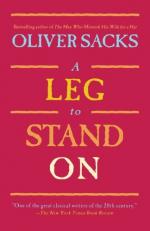
|
| Name: _________________________ | Period: ___________________ |
This test consists of 15 multiple choice questions and 5 short answer questions.
Multiple Choice Questions
1. The day that Sacks moved out of his first hospital room, how far did he walk?
(a) Half a mile.
(b) A mile.
(c) Three blocks.
(d) He could not walk at all.
2. How did one of the surgical registrars refer to being a patient?
(a) As a long trek into the light.
(b) As a pilgrimage.
(c) As a test of patience.
(d) As an opportunity.
3. Why did Sacks refer to the doctor's visits as "odious" (Chapter Six, pg 159)?
(a) He had to play the part of the accepting, passive patient.
(b) The doctor was unusually harsh with him.
(c) He preferred to be the doctor as the patient.
(d) He did not trust or like the doctor.
4. For people with hemi-inattention, what does "anosognosis" mean?
(a) Unawareness of their physical bodies.
(b) Inability to communicate physical distress.
(c) Inability to communicate language confusion.
(d) Unawareness that they are neglecting one half of their bodies.
5. What was Sacks's general opinion about the patients in the convalescent home?
(a) They were pretty knowledgeable about the world and their places in it.
(b) They were all smarter than the doctors.
(c) They were generally stupid and clueless.
(d) None of them had as compelling a story as he did.
6. On one particular September morning, why did Sacks deeply enjoy lighting his pipe?
(a) He thought he had never before had the leisure to light one.
(b) The pipe fit into the scenery and his mood.
(c) He was a smoker.
(d) He saw the pipe as a sign of returning health.
7. When Sacks first entered into the field of neurology, what excited him most?
(a) The possibility for helping ill people.
(b) The challenge of learning the field.
(c) The fact that he would not perform surgery anymore.
(d) The challenge of concepts and abstractions.
8. In the quote about patient waiting, why must the person not think?
(a) He is not ready for thought.
(b) He must combine hope and thought.
(c) He is not strong enough for thought.
(d) He must combine love and thought.
9. Before he took a step, what visual problem did Sacks have?
(a) He could not judge objects or distances.
(b) The floor looked closer than it actually was.
(c) He could not distinguish colors.
(d) He could not see his feet.
10. Once the cast was removed, Sacks gingerly touched his leg. How did it feel?
(a) Like wax.
(b) Like flesh.
(c) Like pudding.
(d) Like marble.
11. What group of people did Weir Mitchell write about?
(a) Wounded Civil War veterans.
(b) Healthy Korean veterans.
(c) Wounded WWII veterans.
(d) The patients in his New York clinic.
12. How does a person suffering from alienation of a limb think about that part of his body?
(a) It seems to belong to someone else.
(b) It makes no sense to him.
(c) He does not think about that limb.
(d) He thinks of himself as whole but injured.
13. What is Hannah Arendt's idea about the space without time?
(a) It is the place where Man must face himself most chillingly.
(b) It is the only home of Soul and Art.
(c) It is the place where Man is not himself.
(d) It is the only place to meet God.
14. While watching the surgery on his right leg, what time does Sacks remember?
(a) His time in the Casting Room.
(b) Preparation for his first surgery.
(c) His agonizing move down the mountain.
(d) The moment he faced the bull.
15. In Chapter Five, Sacks quotes poetry to explain the importance of music: "You are the music/ While the music lasts." Who wrote these lines?
(a) Kant.
(b) Eliot.
(c) St. John of the Cross.
(d) Nietzsche.
Short Answer Questions
1. As Sacks returned to his room, what was the weather like?
2. In the quote from St. John of the Cross in Chapter Three, where does the light guide the man?
3. How must a person react to the abyss?
4. Montaigne, Kant, and Einstein all agree that there is no substitute for what?
5. How do we understand the concepts of time and space?
|
This section contains 699 words (approx. 3 pages at 300 words per page) |

|




